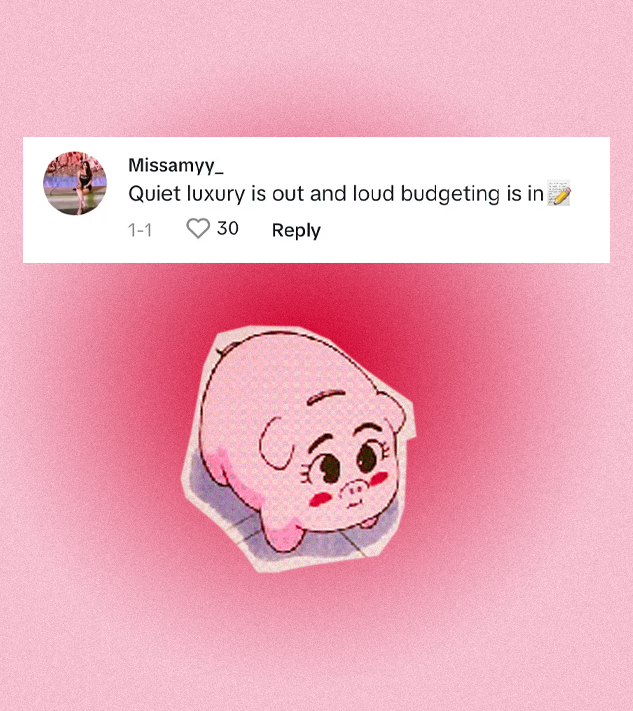Chic to Be Cheap: Is the Rise of Loud Budgeting a Hallmark of Dystopia
Words: Florenne Earle Ledger
In a marked change from the typical quiet tones around spending thriftily, loud budgeting empowers us to turn down plans we can’t afford, share tips that help us save extra cash and be generally more open about being skint. Amidst the hundreds of other trends that encourage spending in exchange for a new and improved version of you, loud budgeting feels like a breath of fresh air. Reevaluating our expenditures is more relevant as we sink deeper and deeper into the cost of living crisis. Although loud budgeting is great because it provides palatable financial advice that can be useful, it all grates at me still. The fact that something as boring as budgeting and as simple as living within your means has started trending demonstrates the impact that soaring inflation has had on everyone. To survive, we’re having to aestheticise the fact that people have less disposable income than they did before as a way of accepting our new reality.
Until the masses were forced to be more conscious about their money, it was never considered trendy to budget. Quiet luxury, that has been popular since last year, is the antithesis of being careful with your cash and people struggling to make ends meet have never felt like they were living a lifestyle that was trending. Working class people have faced judgement for lack of financial stability and been told that it’s their fault for not working harder. Now that middle class people are being hit by this economic crash, suddenly it’s “chic to be cheap”.
As well as the cost of living crisis popularising cut-back culture, how we use the internet and the pandemic changing our relationship with our homes are also key contributors to the rise of loud budgeting. For most Gen Z and millennials, the early days of internet access meant connecting to WiFi and entering a fun alternate world that existed in the computer room, or in the corner of the kitchen on the family desktop. Everything I used the internet for was purely for enjoyment; watching music videos, reading blogs, posting on forums.
___STEADY_PAYWALL___
A decade and a bit later, the gap between reality and online spaces has shrunk. As social media weaves itself into the fabric of our daily routines, rather than a source of escapism, apps like TikTok assist us in everyday life. More and more people use it in lieu of Google. It adds up that we are now seeking answers to our financial woes on social platforms. The app found fame during the global lockdowns of 2020 and championed the personal in everything from beauty tips to house flips.
“Financial wellbeing should not be reserved for the rich to get richer.”
If there was ever a time where we’ve collectively felt hopeless, it was the pandemic. For those of us lucky enough to have a safe place to live, the home became a kind of sacred space. Since then, a lot of internet trends started to reflect our need to maximise home comforts - the Stanley cup, for example, making hydration exciting and aesthetic - rather than exploring joy from the new possibilities of what we could do outside of home. Our optimism for life beyond the familiar has been skewed. Loud budgeting encapsulates our need to improve our home space over life experiences.
Outside of the millennial slog of celebrating meal hacks that make a pack of mince last up to three dinner times, there is a joy still to be found in loud budgeting. For gen z, it’s a newfound autonomy through the apps that they grew up using. Financial advice has largely been a topic of discussion reserved for the upper classes, but now anyone with a phone can easily access budgeting content. Financial wellbeing should not be reserved for the rich to get richer. Everyone should have access to resources that can help them decide how best to spend and save, even on the more minute scale in which we are accessing it.
As our society sinks deeper into capitalism, social media catalyses our dependence on spending money to fill a void in our lives, rather than looking to our political leaders to provide a better standard of living which would lead to a more fulfilled existence. In a way, loud budgeting feels like a form of rebellion against the impulse buying culture that we’ve been taught is an easy way to feel instantly happier. Gaining strength from saying no to spending empowers the individual, leaving no benefits to the capitalist state that wants us to rely on commodities for a greater sense of worth. It tells us there is more that can boost our mood than simply purchasing another little treat.
Rather than feeling alone, accompanied only by a severe sense of FOMO, loud budgeting enables us to find joy in saving our money. It takes away the sense of social shame when you can’t afford what you desire and repackages it as a positive personal choice. While it’s easy to feel disappointed that it was only due to a wide spread recession impacting middle class people that led cheap to become chic and it’s undeniable I feel depressed that the tiresome Tory government is plunging us further into economic chaos, it’s emboldening to see the tides turn away from quiet luxury and towards a more anti-capitalist rhetoric.


